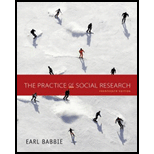
Introduction:
Common errors include inaccurate observations, overgeneralization, selective observation, and illogical reasoning. Inaccurate observations are common among non-scientists who are often only observing casually rather than with a purpose, and so miss many details. Others overgeneralize by using a small sampling to make assertions about whole groups. Biases can be supported through selective observation, by which one could avoid addressing issues one wants to avoid. Illogical reasoning is possible in combination with any of the previous errors as it deals with how conclusions are made. Sometimes, the information is accurate, but the reasoning about it is not, and this results in false conclusions. The website Infowars is based on illogical reasoning it uses to create and spread conspiracy theories. A scientist would avoid this site by focusing on trustworthy sources instead.
Explanation of Solution
Answer and explanation:
(This question requires a subjective response, and this is an example.) As humans we are prone to errors of inquiry, especially when used in non-scientific situations. Casual observation, as used by most people, is open to inaccuracy and selective bias. A pundit trying to support a conspiracy theory may, for example, selectively choose to observe phenomena as evidence to support his or her theory. The same pundit may miss things, consciously or unconsciously, that may challenge the theory. The same person may also use overgeneralization to further their point, for example, citing one failed government program as evidence that the government is always incompetent. Many conspiracy theories are based on illogical reasoning because they require a large number of coincidences to have happened on purpose, and a host of co-conspirators focus in on the plan. An article claiming that global warming is a hoax perpetrated by the solar, wind, and geothermal energy industries is an example of a large, wide-ranging conspiracy theory supported by illogical reasoning. A scientist would avoid these errors by sticking to the scientific method as much as possible, and looking for evidence and support from academically sound sources.
Want to see more full solutions like this?
Chapter 1 Solutions
The Practice of Social Research (MindTap Course List)
 Social Psychology (10th Edition)SociologyISBN:9780134641287Author:Elliot Aronson, Timothy D. Wilson, Robin M. Akert, Samuel R. SommersPublisher:Pearson College Div
Social Psychology (10th Edition)SociologyISBN:9780134641287Author:Elliot Aronson, Timothy D. Wilson, Robin M. Akert, Samuel R. SommersPublisher:Pearson College Div Introduction to Sociology (Eleventh Edition)SociologyISBN:9780393639407Author:Deborah Carr, Anthony Giddens, Mitchell Duneier, Richard P. AppelbaumPublisher:W. W. Norton & Company
Introduction to Sociology (Eleventh Edition)SociologyISBN:9780393639407Author:Deborah Carr, Anthony Giddens, Mitchell Duneier, Richard P. AppelbaumPublisher:W. W. Norton & Company The Basics of Social Research (MindTap Course Lis...SociologyISBN:9781305503076Author:Earl R. BabbiePublisher:Cengage Learning
The Basics of Social Research (MindTap Course Lis...SociologyISBN:9781305503076Author:Earl R. BabbiePublisher:Cengage Learning Criminalistics: An Introduction to Forensic Scien...SociologyISBN:9780134477596Author:Saferstein, RichardPublisher:PEARSON
Criminalistics: An Introduction to Forensic Scien...SociologyISBN:9780134477596Author:Saferstein, RichardPublisher:PEARSON Sociology: A Down-to-Earth Approach (13th Edition)SociologyISBN:9780134205571Author:James M. HenslinPublisher:PEARSON
Sociology: A Down-to-Earth Approach (13th Edition)SociologyISBN:9780134205571Author:James M. HenslinPublisher:PEARSON Society: The Basics (14th Edition)SociologyISBN:9780134206325Author:John J. MacionisPublisher:PEARSON
Society: The Basics (14th Edition)SociologyISBN:9780134206325Author:John J. MacionisPublisher:PEARSON





